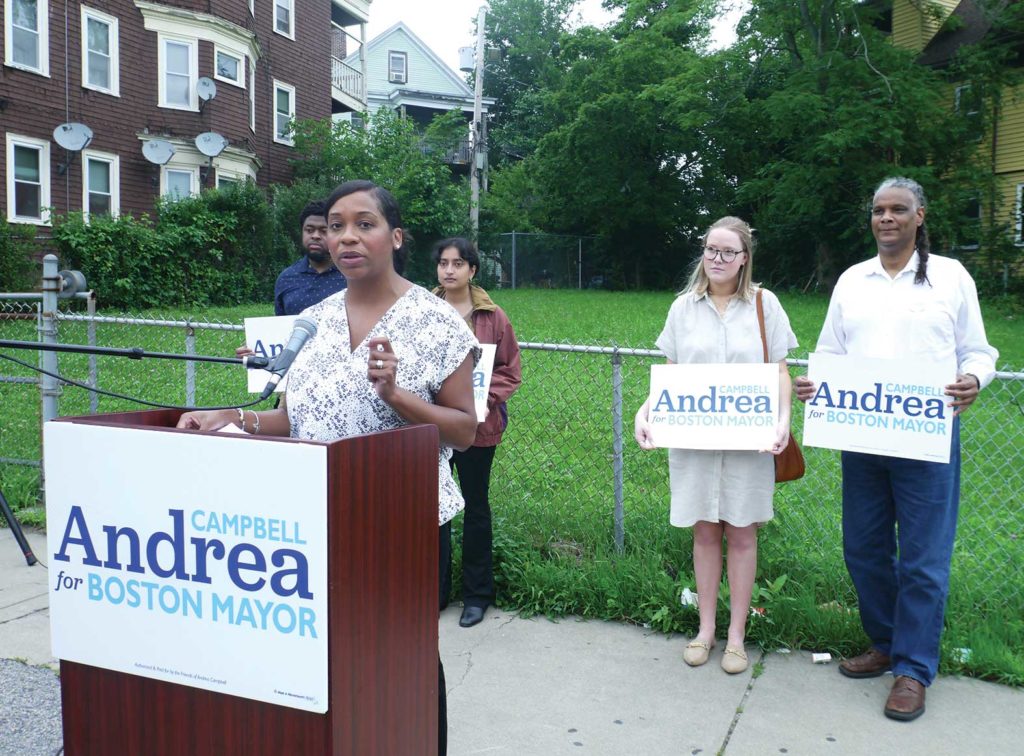Mayoral candidates advance ideas on Boston’s housing crisis
Most oppose rent control, support transfer tax

Andrea Campbell announced in a press conference last Wednesday that, if elected mayor, she plans to take action to develop more affordable housing in Boston, including selling 100 vacant lots owned by the city in her first 100 days in office.
The developed lots would promote affordable housing for local residents, Campbell said. She said her work in housing is also about closing the racial wealth gap and creating jobs.
“I would make sure these lots are used for housing and mixed-use development that will be affordable for those who live here, create local jobs and provide ownership opportunities for residents,” Campbell said.
The plan builds off work she has previously done as District 4 city councilor. She started a vacant lot initiative two years ago, in which she worked with architects, local universities, students, community members and civic leaders to develop plans to build on the city’s vacant lots, which she says are concentrated in Roxbury, Mattapan and Dorchester.
Her plan comes among a slate of candidates’ proposed policies focused on increasing affordable housing in Boston that look at topics from taxing the sale of luxury property to shifting the structure of the Boston Planning and Development Agency (BPDA).
Housing is also a prominent issue for Boston citizens. In a June poll from Suffolk University and The Boston Globe, respondents selected housing as the most important issue that would affect their vote for mayor more than any other issue.
Like Campbell, John Barros proposes using city-owned land for the creation of new affordable housing, including land around community centers and libraries to create access to amenities that will draw people to neighborhoods.
Taylor Connolly, communications director for the Barros campaign, said his plan is “more of a comprehensive neighborhood development approach.”
Also in discussion among the candidates is a real estate transfer tax that would be paid after a property is sold. According to their responses to a Progressive Massachusetts’ 2021 Boston Mayoral Candidate Questionnaire, all candidates support a transfer tax, with most candidates proposing a $2 million threshold for the transfer tax, exempting sales of properties under that value.
In the questionnaire, Michelle Wu, Annissa Essaibi George and Campbell specifically voiced support for the 2019 home rule petition proposed by city councilors Lydia Edwards and Kim Janey that would create a transfer tax of up to 6% on sales over $2 million. The fee would be split between the seller and buyer of the property.
In their responses to the Progressive Mass questionnaire, candidates tend not to support rent control, which was ended in Massachusetts by a ballot question in 1994. Three of the candidates — Campbell, Essaibi George and Barros — do not support allowing rent control, while Wu supports overturning the state-wide ban on rent control. Janey left the question blank.
“I support lifting the statewide ban so municipalities can employ more tools to stabilize communities while creating more affordable housing,” Wu said in her questionnaire response.
In an April poll sponsored by WBUR, the Dorchester Reporter, and The Boston Foundation about 75% of respondents voiced support for rent control, and more than half of the total respondents strongly supported the policy.
Among the debated policies is the fate of the BPDA, with some candidates proposing an independent public office of planning to take over some or all of the current organization’s roles. Candidates Campbell, Essaibi George and Wu take various stances in supporting the policy while Barros is opposed. Janey left the question blank.
For Essaibi George, an independent planning agency would exist separate from the current BPDA. According to her campaign website it would be “dedicated to the forward-thinking and inclusive development of our city.” Meanwhile, Campbell proposes a comprehensive reform of the existing agency.
Wu, on the other hand, proposes abolishing the BPDA completely. In a 2019 report produced as chair of the City Council’s Committee On Planning, Development & Transportation, Wu outlined a plan transitioning resources and responsibilities to the city government before legally abolishing the agency through a home rule petition.
Barros, who oversaw the BPDA as Chief of Economic Development for the City of Boston, would seek to shift how the agency is structured.
“Instead of creating a new separate agency … he is proposing to really transform the way that the BPDA currently operates,” said Connolly, for the Barros campaign.
That transformation, Connolly said, would have the planning arm of the agency oversee everything and dictate needs and resources to the development branch.
Also discussed by candidates in the Progressive Massachusetts questionnaire was shifting the percentage of affordable units in new developments under Boston’s Inclusionary Development Policy. Currently, for any development with more than units, the policy requires 13% of those units to be income-restricted to provide for more affordable housing.
Apart from Janey, who left the question blank, all candidates supported raising the percentage of the developers’ obligation to create income-restricted units. Barros proposed raising it to between 15% and 20%. Essaibi George suggested raising it to 20%. Wu and Campbell proposed looking to raise it above 20%.






